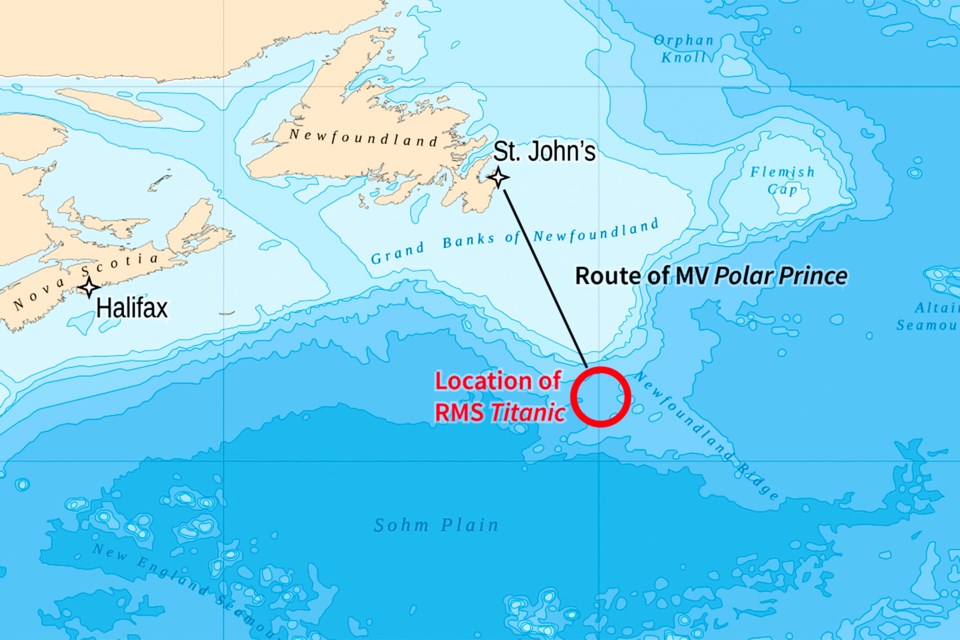It played out before our eyes this week on the TV news as a drama worthy of a Hollywood movie: five men aboard a deep-sea submersible disappear while attempting a tourist trip to the wreck of the Titanic, the iconic ship which sunk on its maiden voyage. The pride of the White Star Line struck an iceberg in April of 1912, and took 1500 souls to a watery grave four kilometres deep in the Atlantic.
OceanGate's Titan submersible lost contact with its service vessel on Sunday, less than two hours after descending into the dark waters hundreds of kilometres south of Newfoundland. The company’s chief executive officer and Titan pilot Stockton Rush, Pakistani-British businessman Shahzada Dawood and his teenage son Suleman, British billionaire businessman Hamish Harding, and French deep sea explorer Paul-Henri Nargeolet were aboard, the latter four having anted-up the $250,000 fee to visit the wreck.
The Titan had enough air to sustain the passengers for three or four days. A massive search and rescue effort was mounted by several countries (including Canada) which rushed ships, planes, and undersea robots to the site. On Thursday, debris was found on the sea floor in the search area, consistent with a “catastrophic implosion of the vessel,” according to naval sources. All the crew are presumed dead. OceanGate released a statement saying, "These men were true explorers who shared a distinct spirit of adventure, and a deep passion for exploring and protecting the world’s oceans."
OceanGate has been chronicling the Titanic’s decay and the underwater ecosystem around it, taking almost 50 people on Titan voyages to the Titanic wreck site since 2021. Allegations have been made that the submersible’s technology lacked sufficient safety protocols to handle the water pressure at Titanic’s depth, which is about 400 times that on land, most recently by Titanic film director James Cameron.
Sadly, the loss of the Titan was not the only maritime tragedy which made headlines in recent weeks.
On Wednesday, June 16, a fishing boat out of Libya, bound for Italy carrying as many as 750 migrants, capsized in the Mediterranean off of Greece, with 78 confirmed dead, and hundreds of bodies still held in the sunken vessel thousands of metres below the surface. I happened to be aboard a cruise ship that was among the first on the scene to help rescue the survivors.
Interestingly, media attention was much more focused on the loss of the Titan and its five affluent passengers, than the loss of hundreds of poor Egyptian, Syrian, Pakistani, Afghan, and Palestinian migrants who paid smugglers thousands of dollars for the perilous journey to Europe’s shores.
The rescue efforts also were a marked contrast, with expensive resources quickly dispatched to aid the wealthy maritime tourists on the Titan, while the Greek Coast Guard vessels, which were in close proximity when the fishing boat sank in the Mediterranean, had done little to prevent the tragedy. The United Nations has suggested that about 25,000 migrants have drowned in the Mediterranean in the past decade, desperate to escape lives of poverty and persecution in their native countries. Countries like Greece have taken a firm stand on such illegal immigration attempts, and have been chastised for not doing more to create migration and asylum policies that embrace greater compassion.
All this begs the question: is comparing tragedies disrespectful, even immoral? Do we declare that tragedy is a continuum, and that some are more horrific that others, based on the status of those affected, or the sheer volume of the victims?
There is an old saying, attributed to Russian political tyrant Joseph Stalin, that “one death is a tragedy, a million deaths is a statistic.” I suppose this is how we attempt to rationalize the scale of terror and tragedy that was the Holocaust.
Natural and man-made tragedies are a daily occurrence in our world, and the pain felt by one individual cannot be judged based off of the anguish felt by another. But the two maritime tragedies noted above are very different, in that the Titan’s passengers were rich deep-sea tourists seeking a thrill and notoriety, while the drowned migrants were simply people desperate to find basic safety and a better life.
All lives matter, billionaires and penniless refugees included. Throngs will commemorate the loss of the five who perished on the Titan, but don’t think for a second that the thousands of migrants who died while making a mad dash to reach Europe across the Mediterranean did not have loves ones who will mourn their loss.



